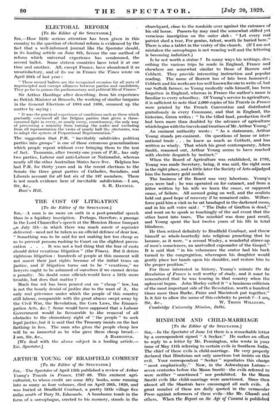ELECTORAL REFORM [To the Editor of the SPECTATOR] SIR,—How little
serious attention has been given in this country to the question of electoral reform is evidenced by the fact that a well-informed journal like the Spectator should, in its leading article .on June 8th, favour the one method of
reform which universal experience has condemned, the second ballot. Some sixteen countries have tried it at one time and another. All, except France, have abandoned it as unsatisfactory, and of its use in France the Times wrote on April 20th of last year :
" These second ballots are the recognized occasion for all sorts of unprincipled and corrupt alliances between parties and candidates, They go far to poison the parliamentary and political life of France."
Sir Arthur fIardinge after describing, from his experience as British Minister at Brussels, the working of similar bargains in the • General Elections of 1894 and 1896, summed up the matter by saying : -
" It was the practical experience of conditions such as these which gradually convinced all the Belgian parties that given a three- cornered fight in every, or, nearly every, constituency, the only way of preventing a minority from turning the scales and excluding from all representation the views of nearly half the electorate, was to adopt the system of Proportional Representation."
The suggestion that P:R. " inevitably subdivides political parties into groups " is one of those erroneous generalizations which peciple repeat without ever bringing them to the test of fact. Tasmania, after twenty-one years of P.R., has only two parties, Labour and anti-Labour or Nationalist, whereas nearly all the other Australian States have five. Belgium has had P.R. for thirty years and in the recent elections to the Senate the three great parties of Catholics, Socialists, and Liberals account fOr all but six of the 187 members. There is not much evidence here of inevitable subdivision.—I am,
















































 Previous page
Previous page